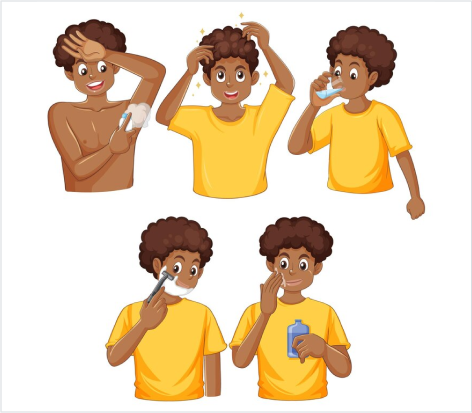Discover the wonders of the human body, from anatomy and development to sexual identity.
First of all, let’s define some of the terms you need to know.
Adolescence: this is the phase of life between childhood👦 and adulthood🧑 when several physical, social, and emotional changes occur.
Adolescents: they are individuals aged 10–19 years.
Puberty: this is the process of physical maturation where an adolescent reaches sexual maturity and becomes capable of reproduction. It is associated with physical, emotional, and hormonal changes.
Hormones: they are chemical messengers produced in the body and cause changes in the body and emotions. They also help your body develop the capacity to reproduce.
Now, let’s talk a bit more about puberty.
Puberty is a time of physical and emotional change that happens as children grow and mature. While everyone goes through puberty, it is different for everyone. It occurs early for some people and later for others; it’s all normal!
Females typically reach puberty at an earlier age than males. Usually, between the ages of 9 and 13. Most girls begin to show signs of puberty, such as menstruation, breast development, growth of hair in the underarm and pubic region, and also experience other physical changes. For boys, they typically reach puberty between the ages of 12 and 14 with the onset of nocturnal emissions or ‘wet dreams’ (involuntary orgasms during sleep😴), production of sperm, growth of facial, pubic, and body hair, deepening of the voice, and other physical changes.

There are similarities between puberty in males and females. They include:
Also there are differences between puberty in males and females. They include:
| SN | Puberty in Males | Puberty in Females |
|---|---|---|
| 1 | Hair grows on the face, chest and legs, in the pubic region and under the armpits | Hair grows in the pubic region and under the armpits. |
| 2 | Voice breaks and deepens considerably | Voice may deepen slightly |
| 3 | Wet dreams | Onset of menstruation (Menarche) |
| 4 | The penis gets bigger | Breasts and nipples grow |
| 5 | Body shape changes: chest becomes broader and breast swells slightly | Body shape changes: hips become wider and broaden |
The changes that come with puberty can be both exciting and confusing. Some who reach puberty early may feel embarrassed or confused, while those who reach puberty late may become worried that they will never mature. Either way, we all want the assurance that we are normal.
Having the information about what to expect during puberty and how to cope with the changes that come with it is very important and helpful in overcoming the fears and challenges. Remember that there is a lot of variation in the timing of puberty!
There are lots of changes that come with puberty and can be broadly classified as physical, social, and emotional changes.
When you reach puberty, taking care of your body becomes very important.
Myths are what is commonly believed, but they are not true. Maybe you have heard some myths that have been passed down to you; read on so that you can know the facts.
We use cookies to improve your experience on our site. By using our site, you consent to cookies.
Manage your cookie preferences below:
Essential cookies enable basic functions and are necessary for the proper function of the website.
These cookies are needed for adding comments on this website.
Statistics cookies collect information anonymously. This information helps us understand how visitors use our website.
Google Analytics is a powerful tool that tracks and analyzes website traffic for informed marketing decisions.
Service URL: policies.google.com (opens in a new window)